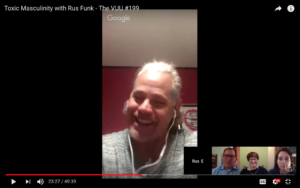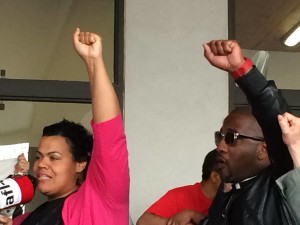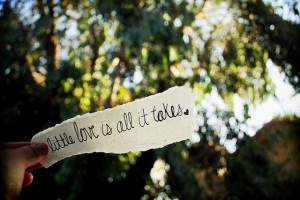The Promises of Family
November 20, 2024Christina Rivera
Lead Ministry Team, Church of the Larger Fellowship
Family is one of those topics that can be both celebrated and filled with tension. Sometimes at the same time! It can bring to mind images of parents, children, siblings—those bound by blood or marriage. And within a liberatory theology, family is something more. It can be a chosen, dynamic, and inclusive concept that welcomes all, just as we are. When we speak of family as Unitarian Universalists, we are called to expand our definition beyond the typical Western idea of family. We are called to understand that family is not something we have but something we build, together.
Western culture is generally considered to be an “I” culture. These cultures have characteristics in which the person is the center and include the idealized version of the nuclear family: mother, father, children. However, if we just scratch the surface of Western culture, we find the vast influences of the global Southern majority and our “We” cultures, in which the community is the center. A “We” culture includes chosen family, identity families, and community family. And while “We” culture is not as widely acknowledged; it is more widely practiced.

From the Article II Study Commission Report: a visualization of the new proposed language for Article II, defining six Unitarian Universalist Values, with the value of Love at the center. Design by Tanya Webster (chalicedays.org)
The exciting news is that our newly affirmed UU values centering Love, Justice, Equity, Transformation, Pluralism, Interdependence, and Generosity can help us in our framing of family. Family doesn’t have to be confined to those who share our DNA but rather, it can embrace those who share in the journey of life with us. In this sense, family is a covenant of love and support, a relationship defined by care, mutual respect, and shared commitment.
And in thinking about that covenant of love and looking at the “I” culture of family, we can see how it can feel limiting and sometimes even harmful. We must ask ourselves: what about those who don’t fit that mold? What about those who find their deepest sense of belonging in friendships, in chosen family, in their communities? What about family who have hurt us?
I think some of those questions can be answered if we look to the lessons from “We” culture. A culture in which family can be the person who sits beside you during difficult times, the neighbor who cares for your children when you’re in need, or the community that rallies around you in times of celebration or sorrow. These relationships are just as sacred, just as valuable, as those bound by biology.
In fact, they may be more intentional and powerful precisely because they are chosen. And they have the added benefit of being able to ask harmful people to move away from community for the time it takes for them to heal and take responsibility for actions. This isn’t a shunning, but rather in the best practice of family, accompanied by non-affected individuals, the person doing harm can have support while they seek to address the issues which led them to harm.
Don’t get me wrong, I’m not saying that “We” cultures have it all figured out and that everything is perfect and rosy. Harm still happens, conflict still exists. But still — no one is thrown away. No one is beyond the hope of God’s love. We simply understand that we don’t need to participate in harm by saying, “oh, that person is family so that’s why they get to keep doing what they do and hurting people.” Rather we say, “you need some time out of community with some folks who can help you heal so that you don’t continue to harm others.” It doesn’t always work, and that is the beauty of our UU commitment to covenant. We can keep practicing so that we do better the next time.
At its heart, family—whether born or chosen—is a covenant. It is a promise to care for one another, to show up when it’s hard, to forgive, and to grow together. As a UU community, we strive to model this kind of covenant at the CLF. We strive to be a place where individuals find the family they may not have experienced in their own lives. It is within these sacred spaces that we nurture one another, celebrate milestones, and bear witness to life’s sorrows and challenges. Our Unitarian Universalist values challenge us to constantly examine and dismantle systems of oppression that prevent people from forming families in ways that reflect their truth. Whether it’s advocating for marriage equality, defending reproductive rights, naming the ongoing genocide in Gaza, or ensuring access to healthcare and childcare, we are called to create a world where every family can thrive. We must continually ask ourselves: Who is the “We” we are talking about and centering? Who is being left out? How can we do better?
In my own life, I have found that family is not something that has stayed exactly the same from season to season. It is one that changes and requires constant attention, love, and patience. We never get it 100% right, we are always asking for grace.
In the end, family, like justice, is love made visible. It is the place where we practice our Unitarian Universalist values, where we learn what it means to live in covenant with one another. Whether through birth, choice, or circumstance, we are all called to create and nurture families that reflect the beauty of our shared humanity. And in doing so, we honor that divine spark of the holy which is within each of us and live into the beloved community that is at the heart of our faith. So say we all and amen.
Rain
January 10, 2024Danny
CLF member, incarcerated in CA
Drops of water fall
Onto sidewalks and raincoats
Gloomy clouds stretch on
Shifting winds and sunshine say,
“This will not be forever.”
“There once was a child”
October 1, 2023Sarai Rose
CLF member, incarcerated in NC
There once was a child who found herself standin’
at the edge of time, life she thought—could be so cold and cruel;
but then there were brief moments when it could be so sublime.
One day, standing in the midst of silence, alone, with nothing but her own thoughts; back to her youthful and nice dreams and wishes,
far out upon life’s dark horizon she sat sifting through yesterday’s painful, cold gray ashes.
Soon she found herself quickly slipping and sliding along life’s bloody ledge, and in her worn and tattered heart, she made a silent pledge.
No matter what she vowed; the coming moments or days might bring, there’d be no surrender, with her all—she’d stand and fight.
She knew deep within, that this journey and all that might come along its long and winding roads, the sorrow and pain, smiles and laughter, like a rose growing among the thorns, this was her own tempering plight.
She had her moments of doubt and pain,
grueling moments, some so bleak, she thought herself on the edge of time’s continuum, only a heartbeat away from going insane.
The days passin’ ever so rapidly, so chaotic, life becoming nothing more than a blur, darkness creeping in until she finds herself slipping into an emotional manhole; empty shadows black as night.
Often she has found herself sitting in the heart of despair, cold and numb, quite dead inside,
from the hungry ghost there is nowhere to hide, while she realizes that in her demise, there’d be no one to truly care.
Within her bleeding and nice heart, there are many scars, wounds left by those who sought to use and abuse without remorse—the weak and naive, demons descended from the fallen stars.
She knows not what tomorrow might bring, nor if she’ll yet witness another precious sunrise, and thus within her heart she begins her silent goodbyes.
The weight of the world rests upon her shoulders; feeling as if she were a daughter of Atlas, yet surrender she’ll never do, she finds her courage to cling to an inner and mysterious faith.
She holds tightly to the voices of her ancestors; that should she endure until the end, very trial and battle, that come the ‘morrow—
She’d be freed of her deep sorrow.
For the sun’s wondrous and golden rays, shall pull her from the depths of hell’s dark and suffocating manhole, freeing her from yesterday’s haunting wraith.
As heaven’s glorious and miraculous light filters into her heart, washing her clean, and re-newing from the depths of her grieving soul. She’s refilled with a love so unconditional, a love far beyond human comprehension, a love she knows will never depart.
Through the windows of her soul has the Divine poured forth a cup of his own pure love, and within this infant’s curious and seeking eyes— burns true hope and assurance given from above.
Our Theological Mandate for Liberation
August 18, 2023Christina delivered the following sermon during a worship service titled “Liberation, Incarceration, and Our Faith,” at General Assembly 2023, the annual gathering of the Unitarian Universalist Association. Her words express the UU theological mandate to work for liberation, particularly the liberation of all people through the abolition of the prison system.
The Rev Dr King: “I have almost reached the regrettable conclusion that the Negro’s great stumbling block in his stride toward freedom is not the White Citizen’s Councilor or the Ku Klux Klanner, but the white moderate, who is more devoted to ‘order’ than to justice; who prefers a negative peace which is the absence of tension to a positive peace which is the presence of justice; who constantly says: ‘I agree with you in the goal you seek, but I cannot agree with your methods of direct action;’ who paternalistically believes he can set the timetable for another man’s freedom; who lives by a mythical concept of time and who constantly advises the Negro to wait for a ‘more convenient season.’”
This quote played over and over in my mind as I visited the Peace and Justice Museum and Memorial in Montgomery Alabama. It was my 5th time experiencing the Museum but only my second since becoming the Co-Lead Minister for the Prison Ministry team at the CLF. And I was trying to work out why it was on loop in my brain. It was a very different kind of “ear worm.” And I think I’ve figured it out.
We are on the daily, bombarded with news too terrible to really react to: guns are the #1 cause of death for children in the US, the climate crisis, attacks on reproductive justice, anti-trans legislation, and the general unraveling of our political systems.
And in that overwhelm, it is easy to say that abolition (yes, it is still that same old abolition of slavery we’re talking about, just dressed differently today) must wait. We’ll figure out what to do about cops and prisons later. But beloveds, I tell you true, the millions who are enslaved and caged in our prisons ask “when? When is this so-called more convenient season?”
So I say this, what we put off today will be even more difficult tomorrow. Evil relies on the principle that a body at rest stays at rest. It overwhelms us until we feel unempowered and ineffective. It relies on our certainty that there will be a “more convenient season” tomorrow, next week, next month, next election cycle, next and next and next.
But we can no longer afford to put off for tomorrow that which must be done today. To be true, we couldn’t afford it yesterday either. Our children literally march in the streets begging us for abolition, in the form of gun control. Our scientists beg for abolition, in the form of climate justice. Our Black and Indigenous peoples demand abolition, in the form of reparations. And our incarcerated siblings demand the abolition of slavery, in the form of prison and police resources transformed into community care resources.
My colleague the Rev. Julian Soto writes, “You are here to put out the ravenous flames of the world. Enough is enough.” In their words I hear that liberation is everyone’s responsibility: it is ours, it is yours. We can try to avoid the discomfort of that or we can face it, knowing we do it in solidarity with the communities whose lived experiences are the keys to making abolition a reality.
These are the tenets of our Unitarian Universalist theological foundation: we are all worthy of universal love and we are all responsible for creating heaven on earth. Beloveds now is the moment, now is the time, now is the season of our Unitarian Universalist mandate for liberation. Now is the inconvenient season of liberation.
So say we all and amen.
276:Meet the Learning Fellows
January 7, 2020Podcast: Download (Duration: 54:43 — 75.1MB)
Subscribe: More
This week we chatted with the CLF Learning Fellows about CLF.
The VUU streams live every Thursday at 11 am ET. We talk about social justice, Unitarian Universalism, religion, spirituality, and whatever else is topical and interesting!
Hosts: Meg Riley, Michael Tino, Aisha Hauser, and Christina Rivera; production support provided by Antonia Bell-Delgado.
The VUU is brought to you by the Church of the Larger Fellowship.
247 – Progressive Faith Beyond Optimism
February 18, 2019Podcast: Download (Duration: 57:52 — 79.5MB)
Subscribe: More
This week on The VUU
This week on The VUU, we chatted with Rev. Nancy McDonald Ladd about her new book, After the Good News: Progressive Faith Beyond Optimism. More information about the book can be found here: https://www.uuabookstore.org/cw_contributorinfo.aspx?ContribID=138878&Name=Nancy+McDonald+Ladd
The VUU is hosted by Meg Riley, Michael Tino, Aisha Hauser and Christina Rivera, with production support provided by Rev Jessica Star Rockers and Margalie Belizaire. The VUU streams live on Thursdays at 11 am ET.
Note: This audio has been slightly edited for a better listening experience. View the live original recording on Facebook.
Freedom to Do as We Will
May 1, 2018Podcast: Download (Duration: 0:49 — 769.8KB)
Subscribe: More
We each have a measure of freedom
To do as we will. Read more →
199: Toxic Masculinity with Rus Funk
November 30, 2017Podcast: Download (Duration: 48:06 — 44.0MB)
Subscribe: More

Join our hosts as they chat with Rus Funk about toxic masculinity. Rus is an author, activist and community organizer who specializes in working with organizations and communities to promote healthy masculinities; equity, diversity and justice; and violence prevention.
Rus Funk is involved with North American MenEngage. Boys and Men for Gender Equality. Check out the website. http://namen.menengage.org/
The VUU is hosted by Meg Riley, Michael Tino, and Aisha Hauser, with production support provided by Jessica Star Rockers. The VUU streams live on Thursdays at 11 am ET.
Note: This audio has been slightly edited for a better listening experience. View the live original recording on YouTube.
Making Justice Now
May 2, 2016Usually we honor someone from our history who serves as a role model on this page, but there are plenty of UU justice-makers who are living and working right now.
Take, for instance, Lena K. Gardner, who is the Membership and Fundraising Director for our own Church of the Larger Fellowship. Lena is a leader with the Black Lives Matter movement in Minneapolis, Minnesota. She organizes and speaks out and brings people together to protest racist ways that the police have treated Black people in their community and other places around the country.
Working with many other people—many of them young adults or even teenagers, they have protested police killing unarmed Black people and demanded that city officials change policies to hold police accountable.
Always using peaceful strategies, they have held protests in America’s biggest shopping mall and on the highway and in front of a police station.
Some people have objected to the Black Lives Matter slogan, saying that all lives matter. But Lena and many others are pushing people to understand the many ways in which Black people are treated as if their lives don’t matter. They are working for a world where everyone finds fairness.
Wishing for Something New
January 1, 2016Many people make resolutions for the New Year of things that they plan to do differently. And many people break those resolutions before the week is out because they didn’t really want to make those changes to begin with. So it helps to start with a resolution that you DO want, not that you think you SHOULD want.
What is one thing that you really, really hope is part of your year to come? Write it down and put it in a jacket pocket. Now you have the year to figure out how to make your wish come true.
Renew Your Membership
We invite you to join your fellow CLFers to renew your CLF membership and stewardship of the CLF for another year.
Support the CLF
Can you give $5 or more to sustain the ministries of the Church of the Larger Fellowship?
Newsletter Signup
About
Quest for Meaning is a program of the Church of the Larger Fellowship (CLF).
As a Unitarian Universalist congregation with no geographical boundary, the CLF creates global spiritual community, rooted in profound love, which cultivates wonder, imagination, and the courage to act.
Contact
Church of the Larger Fellowship Unitarian Universalist (CLFUU)
24 Farnsworth Street
Boston MA 02210




